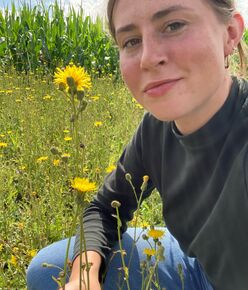Announcement of Awardees – EWRS Travel Grants for Bilateral Cooperation 2025
The evaluation of the second round of EWRS Travel Grants for Bilateral Cooperation has been completed. This program continues to strengthen international collaboration among early-career weed scientists by supporting short-term research stays in the laboratories of EWRS members, encouraging scientific exchange and innovation within the weed science community.
The 2025 call, opened in January, attracted strong applications evaluated by the Bilateral Cooperation Reviewing Committee (Husrev Mennan, Lena Ulber, Aleksandra Saviç, Maor Matzrafi), with additional input from the EWRS Scientific Committee. The selection was based on scientific merit, relevance to weed science, alignment with EWRS goals, and the applicants’ academic potential.
We are pleased to announce the three awardees of the 2025 EWRS Travel Grants for Bilateral Cooperation:
1. Fanny Christine Defant
Home institution: Julius Kuehn-Institute (JKI), Institute for Plant Protection in Field Crops and Grassland, Braunschweig (Germany) & University of Rostock, Faculty of Agricultural and Environmental Science, Crop Health, Rostock, Germany
Host institution: ETSEAFIV, Universitat de Lleida, Dpt. Agricultural and Forest Science and Engineering, Lleida (Spain)
Title of the project: Impact of temperature on germination of Sonchus arvensis
This bilateral research project investigates the germination ecology and growth behaviour of Sonchus arvensis across different European climates, with a focus on temperature and photoperiod effects. Through controlled germination assays and outdoor experiments in both Germany and Spain, the study aims to identify base and optimal germination temperatures and to assess the plants’ withering behaviour under Mediterranean conditions. A comparative analysis with S. oleraceus will provide additional insights into species-specific adaptations. The results will improve understanding of S. arvensis emergence dynamics, contributing to predictive modelling and future weed management strategies under changing climate scenarios.
2. Micaela Malaspina

Host institution: INRAE – UMR Agroécologie, Dijon (France) & Sant’Anna School of Advanced Studies – Institute of Plant Sciences, Pisa (Italy)
Title of the project: Field margins as a management strategy for functional agrobiodiversity
This project examines the ecological role of crop field margins in cereal agroecosystems of Aragón, Spain, focusing on biodiversity, ecosystem services, and weed management. Field margins—spontaneous vegetation strips along crop edges—are analysed for both their ecological benefits and potential as weed reservoirs, integrating agronomic, ecological, and social perspectives. As part of this work, the student will undertake a three-month research stay in 2026 at Scuola Superiore Sant’Anna (Pisa) and INRAE (Dijon), focusing on vegetation data analysis and wildflower strip assessments, respectively. This international collaboration will enhance the student’s skills in ecological data analysis, plant-insect interactions, and habitat management, supporting the development of adaptable strategies for sustainable agriculture, both in Europe and upon her return to Argentina.
3. Venila Elansurya Elangovan

Host institution: INRAE – UMR Agroécologie, Dijon (France)
Title of the project: Exploring intransitive interactions in weed competition and crop-weed dynamics
This research investigates the potential for intransitive competition—a non-hierarchical, cyclic dynamic—to shape weed community structure in wheat agroecosystems. Traditionally, weed competition has been viewed through trait-based hierarchies, favouring dominant species with aggressive growth. However, this project explores whether subordinate species, particularly those with rapid, ground-covering growth (e.g., Veronica hederifolia, Alopecurus myosuroides), can suppress more competitive weeds like Sinapis arvensis, thereby promoting species coexistence and reducing crop yield loss. The study will use 36 controlled planting boxes to simulate different crop–weed and weed–weed interaction scenarios. The expected outcome is that subordinate weeds may restrict the growth of dominant species, improving crop performance and biodiversity. This work challenges traditional weed management models and supports more resilient, ecologically informed cropping systems.
The travel grant awardees and their hosts will now determine the exact date for the cooperation visit in 2025/26. After the visits to the host labs, reports of the travel experiences and project outcomes will be published.
